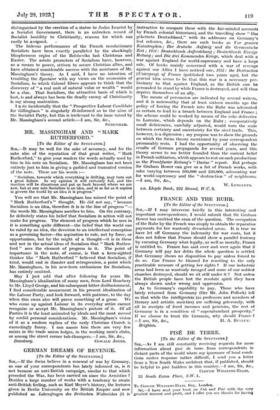MR. MASSINGHAM AND " MARK RUTHERFORD."
[To the Editor of the SPECTATOR.] SIR,—It may be well for the sake of accuracy, and for the sake also of the reputation of that great writer, " Mark
Rutherford," to give your readers the words actually used by him in his note on Socialism. Mr. Massingham has not been entirely just to him in giving a garbled and truncated version of the note. These are his words :-
"Socialism, towards which everything is drifting, may turn out a great failure. In my opinion it will certainly fail, and the reaction will be disastrous and put us back beyond where we are Sow, but at any rate Socialism is an idea, and in so far as it aspires k) govern the world by an idea it is progress."
You will see that Mr Massingham has missed the point of
" Mark Rutherford's " thought. He did not say, " because Socialism is an idea, therefore it is in the line of progress "- the words Mr. Massingham ascribes to him. On the contrary, he definitely states his belief that Socialism in action will not make for progress. The element of progress which he sees in it is something quite different—the belief that the world can be ruled by an idea, the devotion to an intellectual conception as a governing factor—the aspiration to rule, not by force, or opportunism, but by the might of a thought—it is in these and not in the actual ideas of Socialism that " Mark Ruther- ford " sees the element of progress in it. The point of importance in the note, of course, is that a keen-sighted thinker like " Mark Rutherford " believed that Socialism, if tried, would end in disaster and retrogression, a point which Mr. Massingham, in his new-born enthusiasm for Socialism, has entirely omitted.
May I just add that after following for years Mr.
Massingham's idealization of many men, from Lord Rosebery to Mr. Lloyd George, and his subsequent bitter disillusionment, I find considerable amusement in his present idealization of the Labour Party, and look forward, with patience, to the day when this swan also will prove something of a goose. We who come up against Labour in its everyday attire cannot recognize or accept Mr. Massingham's picture of it. Of all Parties it is the least animated by ideals and the most moved by sordid personal considerations. Mr. Massingham's vision of it as a modern replica of the early Christian Church is exceedingly funny. I can assure him there are very few
saints in the trade union lodges, in the working men's clubs, or among the street corner tub-thumpers.—I am, Sir, &c.,






































 Previous page
Previous page